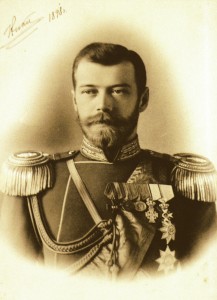Last week I wrote about an exercise from Michael Dixon to help raise the stakes in a scene. And here it is again:
1. Put two characters who share something in common in a place neither can leave. Write a scene in which the obstacles and stakes are high and clearly presented.
Working on my play about the man with the phenomenal memory, (working title: A Hero of the Revolution) I have decided that because the patient can leave the doctor’s office if he wishes, there is more mileage to be gained from another, less expected scenario. What I come up with is a scene between an interrogator and his prisoner–in this case, the psychiatrist who is treating our guy. For the sake of the exercise (if not the play), the doctor is a woman, Natalia; the patient is Alexei, and the interrogator a tough character named Kreplev. What Natalia and Kreplev share is a seething hatred for this man:

Tsar Nicholas II, an inept and bloodthirsty ruler of a nation struggling to emerge from feudalism at the end of the 19th century.
If ever there were a nation in need of a revolution it was Russia in 1917 — but ultimately what emerged was a government even more oppressive and bloody than the monarchy it replaced. In the Birth of the Modern, World Society 1815-1830, Historian Paul Johnson explains why, in a nation in which the concept of individual rights did not exist, Russia’s fate could have been no different.
All of that is by way of prologue. For our purposes, we fast forward to the 1930s, when Stalin’s paranoia has kicked into high gear, and here we open our scene:
A HERO OF THE REVOLUTION, SCENE ONE
Lights rise on a drab office with sick green walls and a window overlooking a brick wall that sports an enormous banner picture of Stalin. Only a quarter of Stalin’s face is visible, an eternally staring eye. Kreplev, a government official, sits at a desk and Natalia leans against the wall opposite.
Kreplev has several files, which he taps on the tabletop. Each time he taps the files, the sound is like a rifleshot. Tap — tap — tap. Tap — and last tap, a light flashes outside the window — as if a gun has been fired, and the report of the rifle report echoing, echoing, echoing, gone. Natalia reacts to this by moving away from the window, but Kreplev does not respond to the sound. It is as if he so accustomed to the sound of gunfire that he can no longer react.
KREPLEV: Now then. I have very little time today, comrade doctor. And I imagine you too have pressing business.
Beat
KREPLEV: I do my best to keep things cordial. Please never let it be said that I have no respect for your profession.
NATALIA: Of all the things on my mind this morning, comrade, that … that is not something I have been troubled by …
KREPLEV: I will consider that a humorous rejoinder comrade doctor and not make a record of it.
NATALIA: Does it matter? Surely someone is taking notes.
KREPLEV: It is always possible. But if we have nothing to hide—then we have nothing to fear.
KREPLEV: Perhaps now, you will join me in a cup of tea?
Kreplev turns to an electric kettle on a table nearby. He plugs the kettle in — a red light surge outside the window—
KREPLEV: Please. Do sit.
He motions to the empty chair. Natalia regards the chair. It begins to glow red.
KREPLEV: Now. To your patient. We find that you have kept many thorough records. After every meeting—you recorded your findings and observations. You are most meticulous, comrade doctor. And he is a most fascinating case is he not?
Beat. She is silent, trying to avoid his eyes.
KREPLEV: Comrade doctor.
Natalia takes a seat.
KREPLEV: Surely you are not still thinking that you have some obligation to this man? Some misguided sense of …. what do you call it?
NATALIA: Patient confidentiality.
KREPLEV: That is not the word I was thinking. Loyalty. Is that not more like it? Some … sense of personal loyalty? Friendship.
NATALIA: He was a patient.
KREPLEV smiles.
KREPLEV: Yes. But doctors often develop some sense of feeling for a patient, do they not?
NATALIA: Some might.
KREPLEV: And you surely must know that we no longer can afford the luxury of personal feelings … when national security is at stake.
You get the idea. Click the link below for the full scene through Alexei’s entrance …
One thing we notice is that by opening the scene as an interrogation and introducing the fantastical elements of the all-seeing dictator outside the window, the train whistle/tea kettle, the radioactive file and ultimately the patient’s entrance in Natalia’s memory, we have cranked up the tension considerably compared to the original scene (too boring to share) with Natalia and Alexei alone for the first time. What is at stake now for Natalia is immediately clear—she will have to sacrifice her professional integrity, and possibly a great deal more, in order to survive; Kreplev we understand is a company man who intends to get the information his bosses want and he has no scruples about how to go about it. Alexei so far is a mystery, as we have very little to go on yet.
Another observation comes to mind. My original scenario as written places Alexei as the central character. But this opening scene suggests to me it might, in fact, be Natalia’s story.
Next week we’ll take a step back and look at another way to dive into the soul and psyche of a character.
For more exercises from Michael Dixon, check out his book, The Playwrights Workout.
